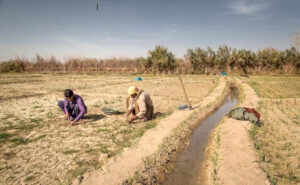KABUL (SW) – Since the establishment of the Islamic Emirate, Afghanistan saw the third annual university entrance exam (Kankor) this month, which was the second without the participation of female students, but finding by Salam Watandar indicate that the numbers of male applicants have also decreased significantly.
The 2024 Kankor exam was conducted with over 87,000 participants, all of them boys, compared to more than 150,000 male participants in previous years.
In the year 2020, well over 240,000 candidates took the Kankor exam, with approximately 160,000 of them being boys. This number dropped to 180,000 in 2021, around 125,000 in 2022 and finally around 85,000 in 2023.
Commenting on this situation, a number of Kankor preparation instructors in Kabul report a decrease in motivation and interest among high school graduates. They also note a dramatic decline in the number of students attending Kankor preparation classes.
Wajid Radfar, a Kankor preparation instructor at the Raufi institute in Kabul, said, “If we compare with the last year of the Republic era, which was 2020, the number of applicants was 240,000, with about 85,000 to 90,000 being female candidates. Even if we consider 100,000 female candidates, there were about 140,000 boys, and now it has halved.”
Radfar explained the reasons further: “During the Republic, we had around 420 students in our preparation classes, whereas now we have only around 170 to 180 students, which means the level of interest in the Kankor has halved.”
Competition among participants in the university entrance exam (Kankor) has always been a defining feature. However, this year, candidates are reporting a noticeable lack of competition.
Mudaser, a participant from Kabul, said: “Undoubtedly, compared to the time of the Republic, the motivation for education has diminished, and the competitive spirit that once existed is no longer there.”
Abdul Hadi, another Kankor participant from Kabul, echoed this sentiment: “There were fewer candidates this year, and I have to say that compared to previous years, there wasn’t much competition; the kind of competition that should have been there wasn’t present this year. We expected a level of competition where everyone would strive and put in effort, but there wasn’t such competition.”
Jamaluddin Sulaimani, an education expert, elaborated on the factors contributing to the decline in the number of Kankor participants: “There are various factors affecting our academic decline. One is the lack of job opportunities, and the second is the unfortunate departure of experts from Afghanistan, where young people no longer see themselves fitting into administrative roles. Additionally, the complex socio-political situation makes it difficult for anyone to foresee their future, leading to academic decline.”
He expressed concerns about the consequences of this declining interest in education: “You can see that since 2020, we have seen a significant decrease in the number of participants, which is truly disastrous. If this situation continues, we will unfortunately see an increase in mass migrations and crime rates. Furthermore, groups interested in conflict and who believe Afghanistan’s issues should be resolved through war will find it easier to recruit members.”
Nearly three years have passed since the Islamic Emirate’s rule began in Afghanistan, and this marks the second Kankor conducted without the participation of girls. In the first year under the Islamic Emirate, girls were allowed to participate in the Kankor with limited options for choosing their fields of study. However, with the current ban on girls’ education, the Kankor process has been significantly affected, and even the participation of boys has noticeably declined.
Saniya, a girl deprived of education, expressed her disappointment: “It’s been almost three years since we’ve been to school. I really wanted to take the Kankor like other girls and become a doctor, but unfortunately, after the Islamic Emirate was established, schools were closed. I’m heartbroken that I couldn’t achieve my dream of becoming a doctor.”
Efat, another girl excluded from education, shared similar feelings: “I really hoped to take the exam and go to university. It makes me very hopeless to see the results announced and see boys passing while we can’t even take the exam. Although I’m happy for them, it makes me very sad for myself and other girls.”
Despite the reduced participation in Kankor and reports about the declining interest, the scores have increased compared to four years ago. In 2020, the highest score was 353, achieved by a girl named Shamsia. In 2022, the highest score was 352, achieved by another girl named Selgai. This year, despite the lack of motivation among students reported by teachers, the top scorer achieved nearly a perfect score of 359.61.
Educators and trainers from some preparatory centers attribute the rise in scores to changes in the Kankor questions, noting that the National Examination Authority has made the questions “simpler and easier.”
Wajid Radfar, the Kankor preparation teacher, explained: “The clear reason for the increase in scores is that the exam questions have become easier, the style has changed, and the questions are not as difficult and competitive as they used to be. The National Examination Authority has understood the reduced interest and the problems faced by young people, and therefore, they have simplified the questions.”
Mohammad Tareq Noor Mohammadi, another Kankor preparation teacher, added: “The questions have changed; some forms have been modified, the questions were easy and lacked balance.”
Despite these challenges, officials from the National Examination Authority of the Islamic Emirate assure the transparency of this year’s Kankor process and report that a significant number of participants have been admitted to higher and semi-higher education institutions.
Abdul Baqi Haqqani, the head of the National Examination Authority, emphasized the importance of the Kankor process during the announcement of the 2024 Kankor results: “This year, the number of Kankor participants was better, and the process was transparent. 41,293 students have been admitted to higher education, 2,144 to semi-higher education, and 1,301 to religious schools, 2,439 are eligible for admissions, and 17,721 were left without results.”






